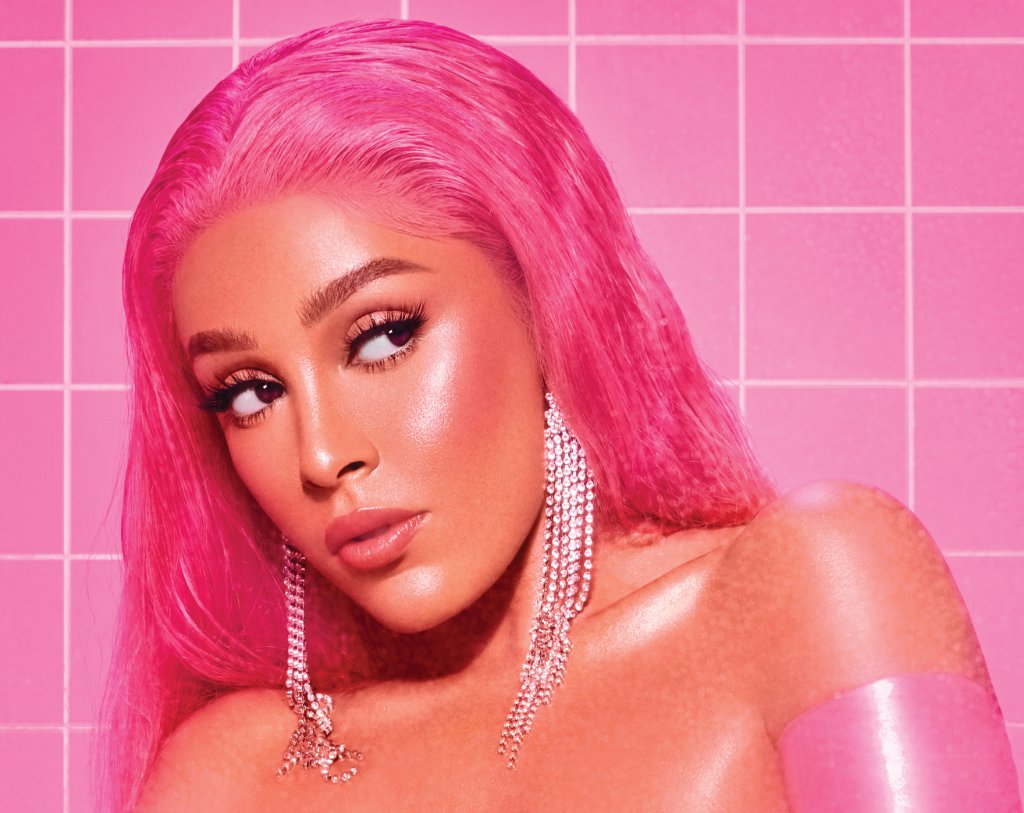Doja Cat's real name, Amala Ratna Zandile Dlamini, was bestowed upon her at birth and holds significant meaning in her life. Doja comes from the Zulu language and means "female ancestor spirit," while Cat is a nickname given to her by a childhood friend due to her feline-like qualities.
Dlamini's unique moniker reflects her South African heritage and embodies the essence of her artistry. Having adopted the stage name Doja Cat, she has risen to fame in the music industry, captivating audiences with her eclectic style, infectious beats, and empowering lyrics.
The exploration of Doja Cat's real name leads us to delve into the broader themes of identity, cultural heritage, and personal expression in the world of music and entertainment. Her journey serves as a testament to the power of embracing one's roots and forging a path that is both authentic and inspiring.
Doja Cat's Real Name
Doja Cat's real name, Amala Ratna Zandile Dlamini, holds cultural significance and reflects her personal identity. Eight key aspects emerge from examining her name:
- Meaningful Moniker: Doja, meaning "female ancestor spirit" in Zulu, embodies her heritage.
- Artistic Expression: Cat, a nickname reflecting her feline-like qualities, inspires her stage persona.
- Personal Identity: Amala represents her individuality and roots, grounding her artistry.
- Cultural Heritage: Dlamini connects her to her South African ancestry.
- Authenticity: Embracing her real name showcases her genuine self.
- Empowerment: Doja Cat's name reflects her strength and confidence.
- Inspiration: Her unique moniker inspires others to embrace their own identities.
- Global Recognition: Doja Cat's name has gained worldwide recognition, representing her musical success.
These aspects intertwine to create a multifaceted understanding of Doja Cat's real name. It serves as a symbol of her cultural heritage, artistic expression, and personal journey. By delving into the meaning behind her name, we gain a deeper appreciation for her identity and the impact she has made in the music industry.
Personal Details and Bio Data of Doja Cat:
| Birth Name: | Amala Ratna Zandile Dlamini |
| Stage Name: | Doja Cat |
| Birth Date: | October 21, 1995 |
| Birth Place: | Los Angeles, California, U.S. |
| Occupation: | Singer, rapper, songwriter, record producer |
| Genre: | Hip hop, pop, R&B |
| Label: | Kemosabe Records, RCA Records |
Meaningful Moniker
The connection between Doja Cat's real name and her stage name is deeply rooted in her cultural heritage. The name "Doja," meaning "female ancestor spirit" in Zulu, holds significant value in her identity and artistic expression.
By choosing to incorporate her Zulu heritage into her stage name, Doja Cat pays homage to her ancestors and acknowledges the influence of her culture on her music. Her stage name serves as a constant reminder of her roots and the traditions that have shaped her.
Furthermore, the name "Doja" embodies the strength and resilience of her ancestors. It represents the spirit of her heritage, which she carries with her in her music and her life. This connection to her cultural identity empowers her and inspires her to create music that is both authentic and meaningful.
By understanding the significance of Doja Cat's real name, we gain a deeper appreciation for her artistry and her commitment to her heritage. It underscores the importance of embracing one's roots and using them as a source of inspiration and empowerment.
Artistic Expression
The connection between Doja Cat's real name and her stage persona lies in the nickname "Cat," which encapsulates her feline-like qualities and serves as an inspiration for her artistic expression.
- Embodiment of Feline Traits:
Doja Cat's stage persona exudes feline-like characteristics such as grace, agility, and independence. These traits are reflected in her music, dance moves, and overall demeanor.
- Expression of Playfulness and Confidence:
The feline-inspired nickname "Cat" allows Doja Cat to express her playful and confident side. It gives her the freedom to experiment with different musical styles and push creative boundaries.
- Connection to Animalistic Instincts:
By embracing her feline-like instincts, Doja Cat taps into a primal energy that fuels her performances and songwriting. It allows her to express raw emotions and connect with her audience on a visceral level.
- Distinctive Personal Brand:
The "Cat" persona has become an integral part of Doja Cat's brand. It differentiates her from other artists and creates a memorable and recognizable image.
In summary, the connection between Doja Cat's real name and her stage persona lies in the nickname "Cat," which embodies her feline-like qualities and inspires her artistic expression. This moniker allows her to showcase her unique personality, connect with her audience, and create a distinctive brand that sets her apart in the music industry.
Personal Identity
The connection between "Personal Identity: Amala represents her individuality and roots, grounding her artistry" and "doja cat real name" lies in the deep-rooted significance of her given name, Amala. This name serves as a constant reminder of her heritage and the values that have shaped her identity as an artist.
By choosing to retain her real name as part of her stage persona, Doja Cat demonstrates a strong sense of self and a commitment to authenticity. Her music is infused with personal experiences and cultural influences, reflecting the unique perspective that comes from embracing her individuality and roots.
The name Amala also holds practical significance in the music industry. In a world where stage names and personas often overshadow real identities, Doja Cat's decision to use her real name sets her apart and establishes a direct connection with her audience.
Furthermore, using her real name allows Doja Cat to maintain a sense of groundedness and humility. It serves as a reminder of her journey and the people who have supported her along the way.
In conclusion, the connection between "Personal Identity: Amala represents her individuality and roots, grounding her artistry" and "doja cat real name" underscores the importance of embracing one's true self and using it as a source of inspiration and strength. Doja Cat's decision to use her real name not only reflects her personal identity but also serves as a testament to the power of authenticity in the music industry.
Cultural Heritage
The connection between "Cultural Heritage: Dlamini connects her to her South African ancestry" and "doja cat real name" lies in the deep significance of her surname, Dlamini, which is a common name among the Zulu people of South Africa.
By incorporating her surname into her stage name, Doja Cat pays homage to her cultural heritage and acknowledges the influence of her ancestors on her music and identity. Her decision to use Dlamini as part of her stage name is a powerful statement about her pride in her South African roots.
Furthermore, using her surname as part of her stage name allows Doja Cat to connect with other people of South African descent and to represent her culture on a global stage. Her music often incorporates elements of Zulu culture, such as traditional rhythms and melodies, which helps to promote and preserve her cultural heritage.
In conclusion, the connection between "Cultural Heritage: Dlamini connects her to her South African ancestry" and "doja cat real name" underscores the importance of embracing one's cultural identity and using it as a source of inspiration and strength. Doja Cat's decision to use her real name, including her surname, not only reflects her personal identity but also serves as a testament to the power of cultural heritage in shaping artistic expression.
Authenticity
In the realm of music and entertainment, authenticity reigns supreme. Audiences crave genuine connections with artists who embrace their true selves, and Doja Cat's decision to use her real name exemplifies this authenticity.
- Transparency and Honesty:
Using her real name fosters a sense of transparency and honesty with her fans. It demonstrates her willingness to be vulnerable and share her true identity, creating a more personal and meaningful connection.
- Artistic Integrity:
By choosing to retain her given name, Doja Cat exhibits artistic integrity. Her music is a reflection of her authentic self, free from the constraints of fabricated personas or stage names.
- Cultural Identity:
Doja Cat's real name is deeply rooted in her South African heritage, and using it as her stage name acknowledges the influence of her culture on her music. It serves as a tribute to her ancestors and a celebration of her cultural identity.
- Fan Connection:
Using her real name allows Doja Cat to establish a stronger connection with her fans. It creates a sense of familiarity and relatability, making her music more resonant and emotionally impactful.
In conclusion, Doja Cat's embrace of her real name underscores the importance of authenticity in the music industry. It not only showcases her genuine self but also fosters a deeper connection with her fans, allowing her music to resonate on a more personal and meaningful level.
Empowerment
The connection between "Empowerment: Doja Cat's name reflects her strength and confidence." and "doja cat real name" lies in the inherent power and self-assurance conveyed by her name. It serves as a constant reminder of her capabilities and the unwavering belief in herself.
- Embracing Cultural Heritage:
Doja Cat's decision to incorporate her Zulu heritage into her stage name empowers her. It demonstrates her pride in her background and her willingness to challenge societal norms by embracing her cultural identity.
- Artistic Expression:
Using her real name allows Doja Cat to express herself authentically through her music. It gives her the freedom to explore diverse genres and push creative boundaries without conforming to expectations.
- Personal Identity:
By choosing to retain her given name, Doja Cat asserts her individuality and self-worth. It reflects her confidence in who she is and her refusal to compromise her true identity for fame or recognition.
- Fan Inspiration:
Doja Cat's empowerment through her name inspires her fans. It sends a message of self-acceptance and encourages others to embrace their unique qualities and pursue their dreams with confidence.
In conclusion, Doja Cat's real name serves as a symbol of her empowerment. It represents her strength, confidence, and unwavering belief in herself. By embracing her cultural heritage, artistic expression, personal identity, and fan inspiration, she empowers not only herself but also those who resonate with her journey.
Inspiration
The connection between "Inspiration: Her unique moniker inspires others to embrace their own identities." and "doja cat real name" lies in the profound impact Doja Cat's name has on her fans and the broader cultural landscape.
Doja Cat's decision to embrace her real name, Amala Ratna Zandile Dlamini, sends a powerful message of self-acceptance and authenticity. It encourages others to embrace their own unique identities and to be proud of their heritage.
Moreover, Doja Cat's music often explores themes of self-love, confidence, and empowerment. Songs like "Boss B*tch" and "Say So" have become anthems for those who want to embrace their individuality and live their lives on their own terms.
In conclusion, Doja Cat's real name and her music serve as a source of inspiration for others to embrace their own identities. Her unique moniker and her message of self-acceptance empower her fans to be true to themselves and to pursue their dreams.
Global Recognition
Doja Cat's real name, Amala Ratna Zandile Dlamini, has become synonymous with her global musical success. Her unique moniker has played a pivotal role in her journey to stardom, contributing to her widespread recognition and solidifying her position as a leading artist in the music industry.
- Establishing a Unique Identity:
Doja Cat's real name sets her apart from other artists and helps to establish a strong and memorable brand. Her unique moniker has become instantly recognizable, creating a distinct identity that resonates with fans worldwide.
- Cultural Representation:
By incorporating her Zulu heritage into her stage name, Doja Cat celebrates her cultural identity and represents her South African roots on a global platform. Her name serves as a symbol of pride and inclusivity, inspiring fans from diverse backgrounds.
- Artistic Expression:
Doja Cat's real name allows her to express her individuality and creativity through her music. It gives her the freedom to explore diverse genres and push artistic boundaries, showcasing her versatility and talent as a performer.
- Fan Connection:
Using her real name fosters a deeper connection with her fans. It creates a sense of familiarity and relatability, making her music more personal and emotionally resonant. Fans feel a connection to Doja Cat on a deeper level, knowing that she is authentic and genuine in her artistic expression.
In conclusion, Doja Cat's real name has played a crucial role in her global recognition and musical success. It has helped her establish a unique identity, celebrate her cultural heritage, express her artistic vision, and connect with fans worldwide. Her name has become synonymous with her talent, creativity, and the empowerment of self-expression.
FAQs about Doja Cat's Real Name
The following are frequently asked questions and their respective answers regarding the real name of the renowned musician, Doja Cat.
Question 1: What is Doja Cat's real name?
Her full name is Amala Ratna Zandile Dlamini.
Question 2: What is the meaning behind her name?
The name "Doja" is derived from the Zulu language and means "female ancestor spirit," while "Amala" signifies "pure" in Sanskrit.
Question 3: Why did she choose to use the stage name "Doja Cat"?
Doja Cat has stated that she adopted the stage name as a playful and creative representation of her personality, combining her given name with a feline-like persona.
Question 4: How does her real name reflect her cultural heritage?
Incorporating her Zulu surname, Dlamini, into her stage name pays homage to her South African roots and acknowledges the influence of her cultural background on her music.
Question 5: Has she always used her real name professionally?
Initially, Doja Cat performed under the pseudonym "Aquaria," but later decided to embrace her given name as a testament to her authenticity and self-acceptance.
Question 6: How has her real name impacted her career?
Using her real name has fostered a strong connection with her fans, as it represents her genuine identity and allows them to relate to her on a more personal level.
In summary, Doja Cat's real name, Amala Ratna Zandile Dlamini, holds cultural significance, embodies her individuality, and has played a pivotal role in shaping her successful music career.
Transition to the next article section: Doja Cat's Musical Influences and Artistic Evolution.
Tips Related to "doja cat real name"
Insights into the significance of Doja Cat's real name, Amala Ratna Zandile Dlamini, can provide valuable guidance for personal branding, cultural appreciation, and artistic authenticity.
Tip 1: Embrace Your Cultural Heritage:
Incorporating elements of your cultural background into your personal or professional identity can create a strong and meaningful connection with your roots. It demonstrates pride in your heritage and fosters a sense of belonging.
Tip 2: Be Authentic and True to Yourself:
Using your real name, or a variation that resonates with your authentic self, allows you to connect with your audience on a deeper level. Authenticity builds trust and credibility, which are essential for long-term success.
Tip 3: Craft a Unique and Memorable Moniker:
When creating a stage name or brand identity, strive for a name that is distinctive, easy to remember, and reflects your personality or artistic vision. A well-crafted moniker can leave a lasting impression and help you stand out in a competitive industry.
Tip 4: Consider the Impact on Your Audience:
When choosing a name, consider how it will be perceived by your target audience. Ensure it is appropriate, respectful, and aligns with the image you want to convey.
Tip 5: Be Prepared to Explain Your Name's Meaning:
If your name has a unique or significant meaning, be prepared to share its story with others. This can create a deeper connection and provide insights into your identity and values.
In conclusion, understanding the significance of Doja Cat's real name offers valuable lessons for personal branding, cultural appreciation, and artistic authenticity. By embracing your heritage, being true to yourself, crafting a unique moniker, considering your audience, and being willing to share your story, you can create a strong and meaningful identity.
Conclusion
The exploration of "doja cat real name" has revealed the multifaceted significance of an artist's true identity. Doja Cat's real name, Amala Ratna Zandile Dlamini, embodies her cultural heritage, artistic expression, personal identity, and global recognition. It serves as a testament to the power of authenticity and self-acceptance in the music industry.
The key takeaway from this exploration is the importance of embracing one's unique identity and showcasing it to the world. By doing so, artists can connect with their audience on a deeper level, inspire others, and leave a lasting impact on the world. Doja Cat's real name stands as a reminder that true success is built upon a foundation of authenticity and self-belief.
Unveiling The Dynamic World Of Becky Taylor Timberwolves
Unveiling The Enigmatic Spouses Of Eddie Fisher: A Journey Of Love, Fame, And Intrigue
Unveiling The Truth: Is Ronaldo A Devout Muslim? Uncover The Surprising Insights



ncG1vNJzZmiclZnGtHrApqpsZpSetKrAwKWmnJ2Ro8CxrcKeqmebn6J8pbvJmmScmaRiv6aty2almqWVY7W1ucs%3D